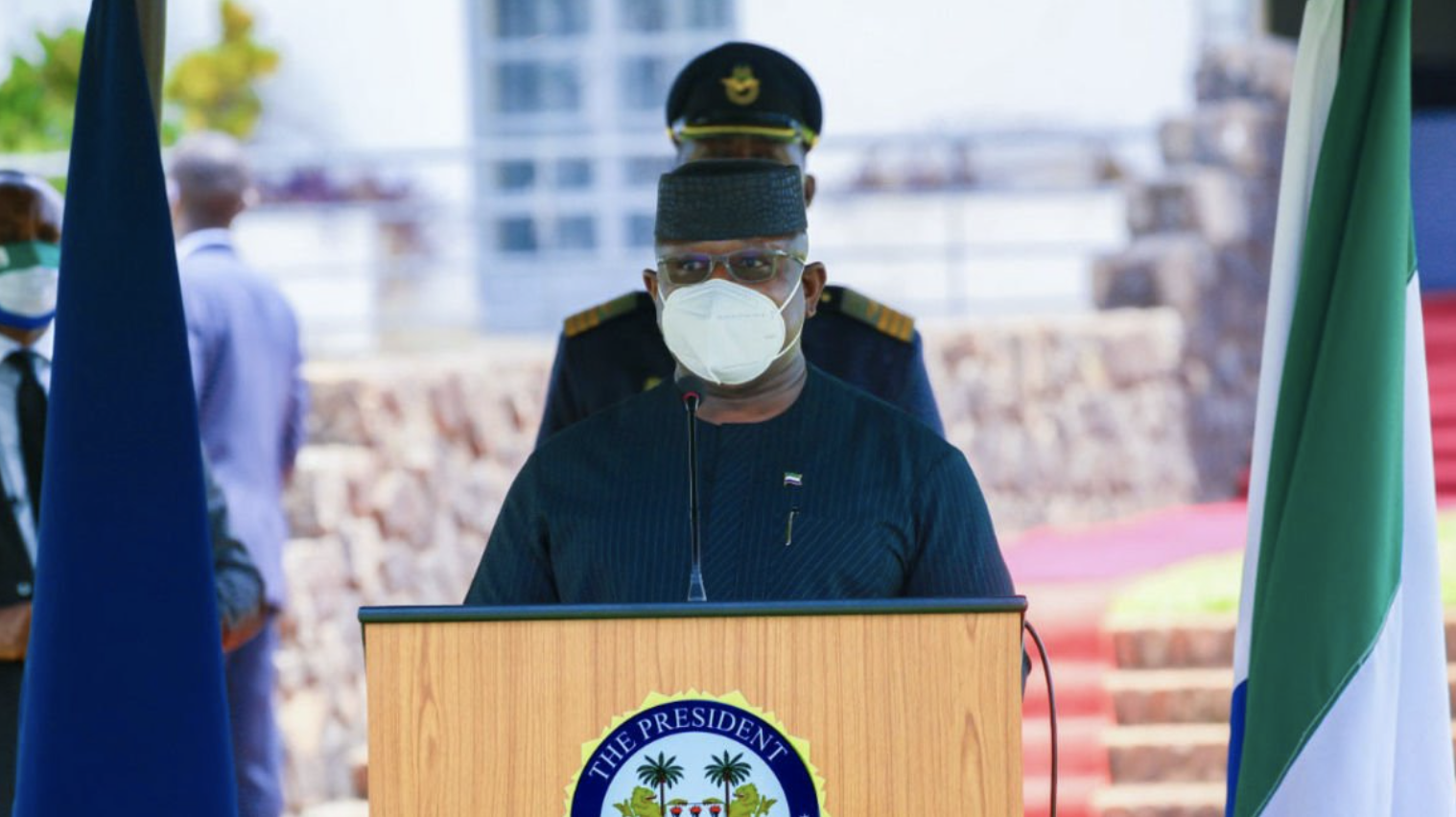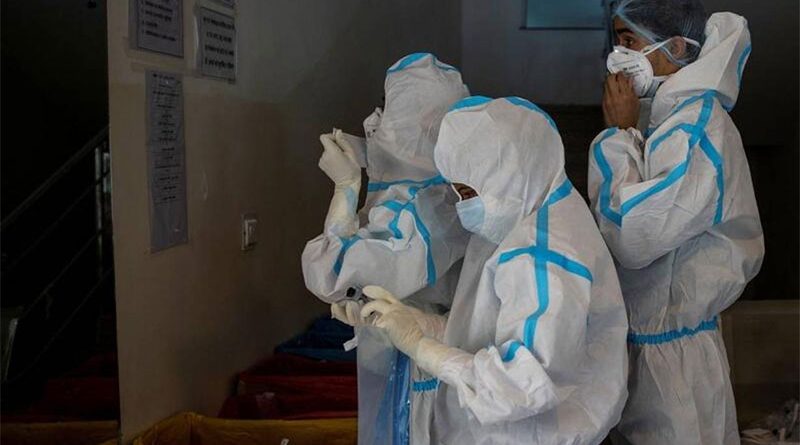Sierra Leone’s President Julius Maada Bio has reimposed a nationwide curfew as part of new measures aimed at curbing rising Covid-19 cases. President Bio, in a televised address on State broadcaster SLBC on Monday, said the month-long curfew would run from 11pm to 5am. He also banned congregational worship for a month, starting Friday, and said restaurants and bars will close at 9pm daily. The President also announced that funerals, weddings and all other social events will have a maximum of 50 participants. The country is grappling with a third wave, which the government says has seen both infections and fatalities rise exponentially. Data from the National Covid-19 Emergency Response Center (NaCOVERC) show that Sierra Leone has recorded its highest numbers in June. As of Monday, the country had recorded 5,652 cases and 102 deaths. Reasons for concern President Bio said the new anti-virus measures were based on experts’ advice, following careful data analysis. He also noted the existence of the deadlier ‘Delta’ variant of the coronavirus, which NaCOVERC says is fueling the third wave. “More people have tested positive for Covid-19 in the last few weeks. More people have been hospitalised and 72 percent of beds in treatment and care centers are occupied. More people are dying and the western area is the epicenter of the latest infections,” the President said in his address. “We have assessed the data and carefully examined patterns of infection. We have closely looked at the trends. We believe we must take urgent steps to stem this third wave of the pandemic in Sierra Leone and thus save lives and protect livelihood.” The measures will be reviewed regularly as advised by medical experts, Mr Bio said and asked the public to adhere to the basic rules of social distancing, wearing masks and washing hands regularly. President Bio also reiterated calls for the public to trust the safety of the Covid-19 vaccine and get the jab. Country’s tack record Sierra Leone recorded its first Covid-19 case on March 31, 2020. Since the second wave, the country was praised for keeping cases and fatalities low, compared to its neighbours, until the third wave was confirmed. Two weeks ago, the World Health Organization ranked Sierra Leone, its neighbour Liberia and the southern African nation of Namibia as countries with some of the highest case numbers. Sierra Leone was one of the first countries to impose restrictions, making the move even before recording its first case of the deadly disease. It imposed a one-year state of emergency, a nationwide curfew and occasional lockdowns, restrictions which were lifted exactly a year ago.
The head of DR Congo's fight against Covid-19 warned Thursday of "catastrophe" if the Delta variant keeps rapidly spreading in the country, saying hospitals were already overwhelmed and morgues overflowing.
Africa has largely been spared the worst of the pandemic seen elsewhere, but DR Congo's case numbers have jumped over the last month and the highly contagious Delta variant now represents 84 percent of infections.
DR Congo recorded 112 new cases over the past 24 hours, including 76 in the capital and epicentre of its epidemic Kinshasa, raising the country's total to 41,353. It has also recorded a total of 933 deaths.
Jean-Jacques Muyembe, head of the National Institute of Biomedical Research (INRB) and the person charged with the country's coronavirus response, said the "evolution of the Delta variant is very worrying".
"The contamination is rapid and if it continues, it will be a catastrophe in the DRC," he told an online press conference held by the World Health Organization's Africa office.
"Our hospitals are overwhelmed, the morgues are overflowing, many politicians and university professors have been infected with the virus, and many have died."
WHO Africa said the Delta variant, which first emerged in India, has now been reported in 16 countries on the continent.
"It is the most contagious variant ever detected, with a rate of transmissibility 30 to 60 percent higher than other variants," WHO Africa said at the press conference.
WHO Africa director Matshidiso Moeti said quick action must be taken "to strengthen prevention measures and avoid an emergency situation transforming into a tragedy".
DR Congo, like other African countries, is suffering from a crippling shortage of Covid vaccines.
"We are expecting five million doses, which will be a mixture of two or three vaccines, to paid for directly by the government," Muyembe said, adding they would arrive on Monday.
Source - The East Africa
Tanzania has recorded 100 cases of Covid-19 in the third wave, 70 patients of whom are in critical condition and on ventilators, Tanzanian President Samia Suluhu Hassan said Monday.
She spoke during a meeting with editors at the State House in Dar es salaam Monday evening.
This is the first time in more than a year that Tanzania is releasing Covid statistics. It last released Covid-19 data in April 2020 and the then president John Magufuli’s administration denied Covid existence in the country.
President Samia has adopted a completely different approach to dealing with the pandemic since ascending to power on March 19, following Magufuli's death on March 17.
She said on Monday that as soon as she was sworn in as President, she embarked on ways to adopt globally-accepted measures of preventing the spread of the coronavirus, including vaccination.
Meanwhile, the Tanzanian government says it will spend at least $470 million to purchase Covid-19 vaccines and bail out sectors that were severely hit by the pandemic.
The President further said Tanzania has registered for the Covax initiative and will therefore be ready to administer the vaccine doses in the near future.
“We have $470 million to order vaccines and equipment to use in the fight against coronavirus,” she said.
She added that vaccination will be voluntary to give citizens the opportunity to choose what is best for them.
“We have decided to vaccinate voluntarily. Whoever wants to be vaccinated can be vaccinated…there are many Tanzanians, including businesspeople, who have already vaccinated in Dubai and in other places,” she said.
The President did not name the vaccine the country will procure given many nations have developed jabs for the killer virus which brought global economies to their knees.
Recently, the government applied for a $571 million loan from the International Monetary Fund (IMF) to help it tackle economic challenges resulting from the pandemic.
Tabling the government’s Tsh36.3 trillion ($15.78 billion) 2021/22 budget in Parliament on June 10, the government said the IMF loan was a low-interest loan aimed at tackling the social and economic impacts of Covid-19.
IMF officials in Dar es Salaam and Washington were quoted by Reuters as confirming talks on the matter, noting, however, that Tanzania would have to provide information on Covid-19.
Source - The East African
The current Covid-19 surge in Africa is proving to be the most brutal in the continent, warn the World Health Organisation’s Regional Office for Africa and the Africa CDC, even as the vaccine supply crunch persists.
Director of the Africa Centres for Disease Control and Prevention (Africa CDC) John Nkengasong said last week on Thursday that Africa was losing the battle against the coronavirus and expressed concern that the virus might gain what he called “endemicity” in parts of the continent.
Africa is facing a fast-surging third wave of Covid-19 pandemic, according to WHO with cases spreading more rapidly and projected to soon overtake the peak of the second wave the continent witnessed at the start of the year.
“Timely access to vaccines to vaccinate at scale and with speed is crucial if we’re to win this battle,” said Dr Nkengasong.
This comes even as it became apparent that the WHO-backed Covax was headed for an overhaul over its failure to deliver on its mandate to procure vaccines for the continent.
Dr Nkengasong warned that without expeditious access to vaccines the virus will spread to rural areas, where it is extremely difficult to mop up, “because that will become the beginning of the endemicity of the pandemic and we will then move from a pandemic to thinking of how to manage it in terms of an endemic disease as with malaria, HIV and others.”
The original plan was to do rapid mass vaccinations, which unfortunately has not happened and we are far away from the targets we had hoped to achieve by now.”
During the week, the World Bank announced that it was stepping in to help Africa get vaccines. The announcement was made during a meeting between African finance ministers and the lender.
Hospitals in Uganda, DR Congo and Zambia have been overrun by the pandemic and the WHO is deploying more laboratory experts to monitor variants of concern.
“The third wave which has hit 20 countries thus far, has come with a severity that was not expected. Most countries were not prepared for it,” said Dr Nkengasong.
The Africa CDC said the delta variant is aggressively taking over from other variants in 20 countries on the continent.
“The third wave is picking up speed, spreading faster, hitting harder. With rapidly rising case numbers and increasing reports of serious illness, the latest surge threatens to be Africa’s worst yet. Africa can still blunt the impact of these fast-rising infections, but the window of opportunity is closing. Everyone everywhere can do their bit by taking precautions to prevent transmission,” said WHO regional director for Africa, Matshidiso Moeti.
Source - The East African




